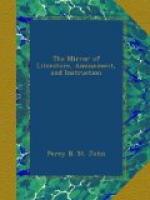John Hunter.
Hunter was a philosopher in more senses than one; he had philosophy enough to bear prosperity, as well as adversity, and with a rough exterior was a very kind man. The poor could command his services more than the rich. He would see an industrious tradesman before a duke, when his house was full of grandees, “you have no time to spare,” he would say, “you live by it; most of these can wait, they have nothing to do when they go home.” No man cared less for the profits of the profession, or more for the honour of it. He cared not for money himself, and wished the Doctor [his brother William] to estimate it by the same scale, when he sent a poor man with this laconic note:—
“Dear Brother,—The
bearer wants your advice. I do not know the
nature of the case. He
has no money, and you have plenty, so you are
well met.”
“Yours, J. HUNTER.”
He was applied to once to perform a serious operation on a tradesman’s wife; the fee agreed upon was twenty guineas. He heard no more of the case for two months; at the end of which time he was called upon to perform it. In the course of his attendance, he found out that the cause of the delay had been the difficulty under which the patient’s husband had laboured to raise the money; and that they were worthy people, who had been unfortunate, and were by no means able to support the expense of such an affliction. “I sent back to the husband nineteen guineas, and kept the twentieth,” said he, “that they might not be hurt with an idea of too great obligation. It somewhat more than paid me for the expense I had been at in the business.”
* * * * *




